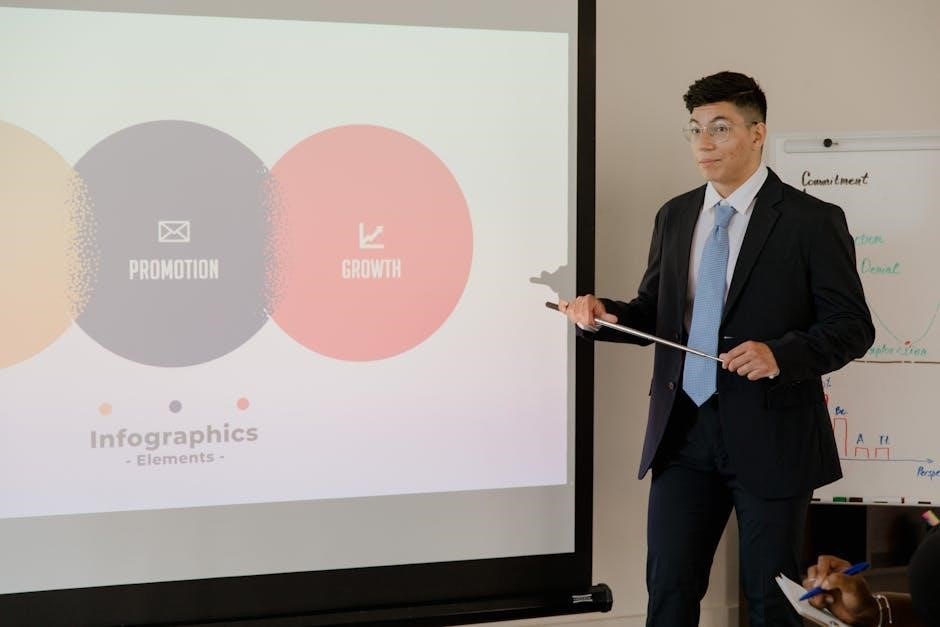Developing the Leader Within You: An Overview
This section provides an overview of the core concepts presented by John C․ Maxwell, focusing on how individuals can unlock their leadership potential․ It emphasizes the importance of influence, integrity, and vision and practical steps to achieve leadership success․

Key Leadership Qualities Highlighted by Maxwell
Maxwell emphasizes integrity as a foundation, vision for direction, and influence to inspire․ Leaders should embrace these qualities while developing motivation and value in their actions․ These aspects are critical for effective leadership, impacting every sphere․
Integrity as a Foundation for Leadership

Integrity forms the bedrock of effective leadership, influencing trust and respect among followers․ Maxwell underscores that self-governance in thoughts, actions, and values paves the way for genuine leadership․ A leader’s character directly impacts their ability to inspire and guide others, making integrity non-negotiable․

Without integrity, leaders risk losing credibility and undermining their influence․ Maxwell’s approach highlights that true leadership stems from inner strength and ethical conduct․ By prioritizing integrity, leaders cultivate a positive environment, promoting collaboration and commitment․
Furthermore, integrity demands rising above human character flaws and striving for continuous improvement․ This commitment fosters trust and loyalty, essential elements for successful leadership․ Maxwell emphasizes that leaders with integrity inspire others, creating a ripple effect of positive change and ethical behavior throughout the organization․ Therefore, integrity is a cornerstone for leaders seeking lasting impact and influence․
The Importance of Vision in Effective Leadership

Vision acts as a compass for leaders, guiding them and their teams toward a defined future․ Maxwell emphasizes the necessity of a clear and compelling vision to inspire and motivate followers․ A strong vision provides direction and purpose, enabling individuals to align their efforts and achieve common goals․
Effective leaders articulate their vision in a way that resonates with their team, fostering a shared understanding and commitment․ This clarity ensures that everyone comprehends the desired outcome and their role in achieving it․ A well-defined vision elevates expectations, instilling hope and driving individuals to surpass their perceived limitations․

Moreover, vision enables leaders to make strategic decisions and navigate challenges effectively․ By keeping the desired future in mind, leaders can prioritize tasks and allocate resources efficiently․ Maxwell highlights that vision is not merely a dream but a practical tool for achieving tangible results, empowering leaders to create lasting impact within their organizations and communities․
Influence as the Core of Leadership
Maxwell posits that influence is the very essence of leadership, distinguishing it from mere authority or position․ True leadership arises not from a title but from the ability to inspire and motivate others to follow a shared vision․ Influence allows leaders to garner support, build consensus, and drive collective action towards achieving organizational objectives․
Effective leaders cultivate influence by building strong relationships, demonstrating empathy, and communicating effectively․ They understand the needs and aspirations of their team members, fostering an environment of trust and mutual respect․ This allows leaders to inspire their followers to improve their skills and become leaders themselves․
Furthermore, influence enables leaders to navigate challenging situations and overcome obstacles․ By leveraging their persuasive abilities, leaders can garner support for innovative ideas, resolve conflicts, and foster a culture of collaboration․ Maxwell underscores that influence is not about manipulation but about empowering others to reach their full potential, creating a ripple effect of positive change throughout the organization․

Practical Application of Maxwell’s Principles
This section explores how Maxwell’s leadership principles can be applied in real-world scenarios․ It focuses on actionable strategies for developing key leadership qualities, such as integrity, vision, and influence within teams and organizations․
Developing Your Most Appreciable Asset: People
A leader’s effectiveness hinges significantly on their ability to inspire leadership in others, shifting from mere followership to active participation․ Andrew Carnegie emphasized delegating responsibilities and sharing credit, highlighting that true leadership involves empowering individuals․ Paying close attention to followers, inspiring them, and shaping them into leaders themselves is crucial․ Leaders should instill faith in their leadership abilities, helping them develop and hone their skills․

Maxwell’s principles encourage leaders to cultivate an environment where individuals feel valued and important․ This involves fostering open communication, providing opportunities for growth, and recognizing contributions․ Creating new leaders requires instilling faith in abilities and developing skills․ Leaders are encouraged to motivate and inspire․ By investing in the development of people, leaders create a ripple effect, enhancing team performance and overall organizational success․ This approach transforms individuals into valuable assets, driving innovation and achieving shared goals through collaborative leadership․

Leadership Development as a Continuous Process
Leadership development is not a one-time event but an ongoing journey of self-improvement and skill enhancement․ Aspiring leaders should view leadership as a dynamic process requiring constant learning and adaptation․ This continuous development involves regularly assessing one’s strengths and weaknesses, seeking feedback, and actively pursuing opportunities for growth․ Embracing this mindset allows leaders to stay relevant, innovative, and effective in an ever-changing environment․
Moreover, continuous leadership development includes expanding one’s knowledge base through reading, attending workshops, and engaging with other leaders․ It also entails cultivating essential qualities such as integrity, vision, and influence․ Leaders must commit to self-governance, ensuring their thoughts, actions, and values align with ethical principles․ By prioritizing continuous development, leaders not only enhance their own capabilities but also inspire their teams to embrace a culture of lifelong learning, fostering a more dynamic and successful organization․ This commitment to growth ensures leadership remains effective and impactful․

The Importance of Self-Development for Leaders
Self-development is paramount for leaders aiming to maximize their impact and effectiveness․ It involves a proactive commitment to personal growth, encompassing various aspects of one’s character, skills, and knowledge․ Leaders who prioritize self-development are better equipped to inspire, motivate, and influence others․ This dedication to self-improvement not only enhances their leadership capabilities but also sets a positive example for their teams, fostering a culture of continuous learning and growth․
Furthermore, self-development allows leaders to identify and address their weaknesses, build upon their strengths, and adapt to evolving challenges․ It involves cultivating essential qualities such as integrity, vision, and emotional intelligence․ By investing in self-development, leaders enhance their ability to make sound decisions, communicate effectively, and build strong relationships․ This ongoing process of self-improvement enables leaders to remain relevant, innovative, and impactful in an ever-changing world․ Ultimately, a leader’s commitment to self-development directly contributes to their success and the success of their organization․
The journey to becoming an effective leader, as highlighted by Maxwell, centers on several key principles․ First, integrity is the bedrock upon which leadership is built, fostering trust and credibility․ Second, a clear and compelling vision is crucial for guiding and motivating followers toward a shared purpose․ Third, influence, rather than mere authority, is the true essence of leadership, enabling leaders to inspire and empower others; Self-development emerges as a continuous process, vital for personal and professional growth․
Furthermore, leaders must prioritize developing their people, recognizing that their most appreciable asset lies in their team’s potential․ This involves inspiring, motivating, and shaping followers into leaders themselves․ Effective leaders also understand the importance of delegating responsibilities and sharing credit, fostering a collaborative and empowering environment․ By embracing these key takeaways, aspiring leaders can unlock their potential, maximize their impact, and create a lasting legacy of leadership excellence․ The core is to always improve upon flaws and better the ability to trust․